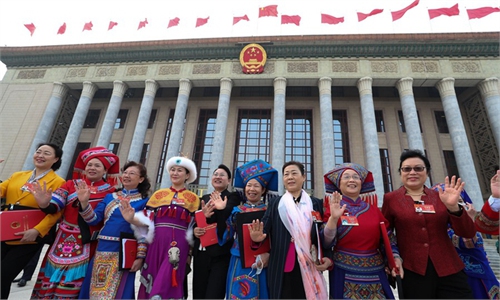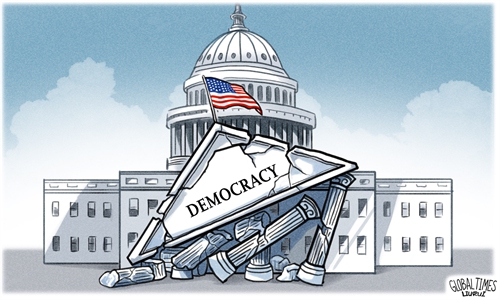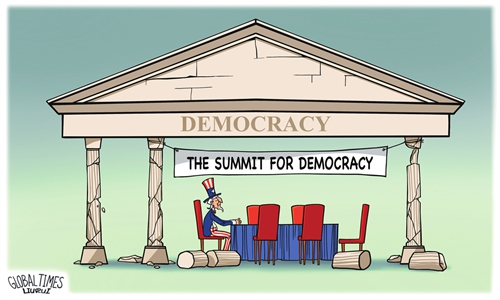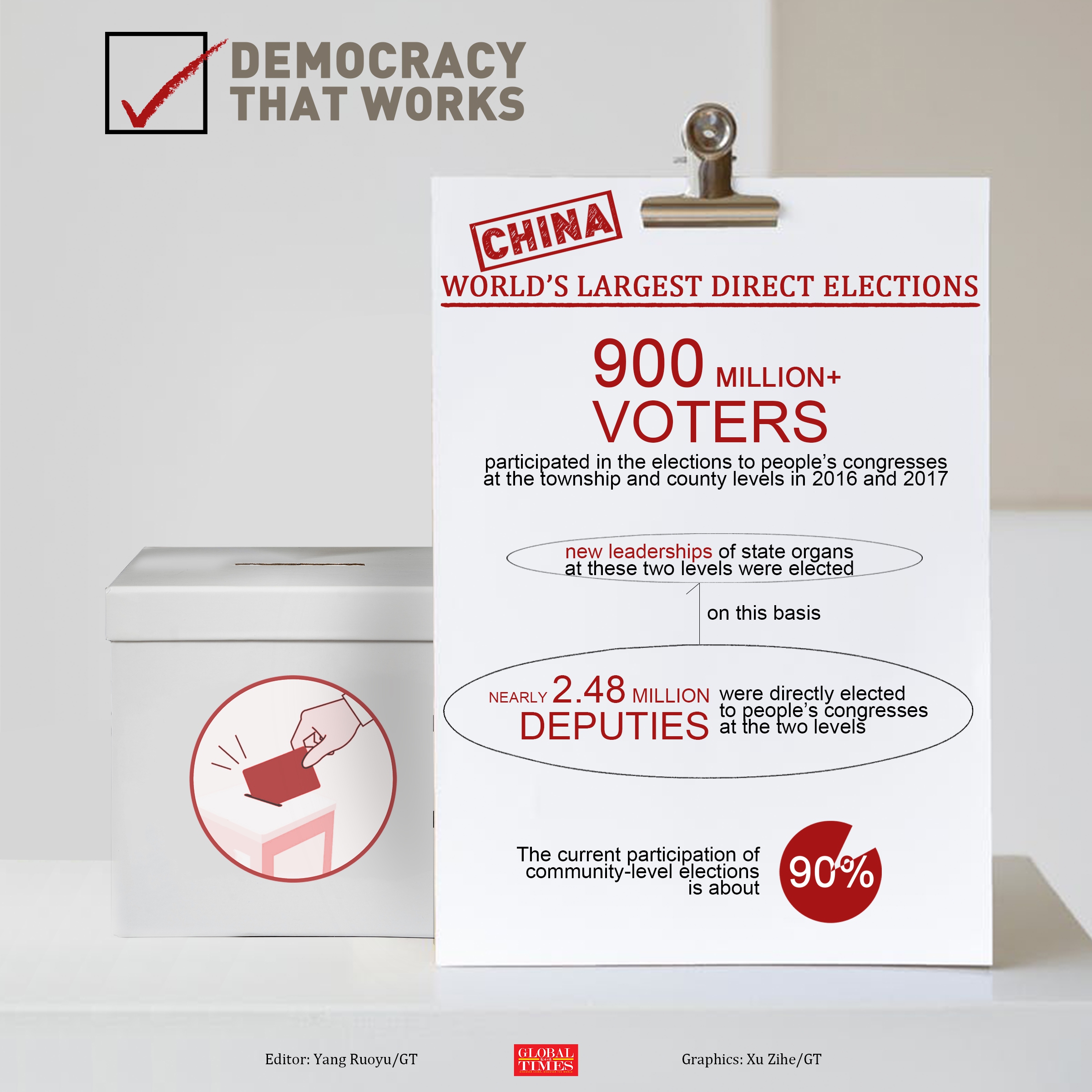
Democracy that works in China Graphics: Xu Zihe/GT
China released on Saturday a white paper on its democratic model, elaborating in a comprehensive way with details and examples on how the whole-process democracy with people's full participation in China works, why China can't copy the so-called Western model of democracy, and why China is confident and has the strength in expounding on its democracy.
The white paper was released before the US' "democracy summit," which was scheduled to be held on December 9 and 10, and criticized for promoting democratic hegemony under the banner of democracy and dividing the world by ideology.
The white paper, titled China: "Democracy That Works," was released by the State Council Information Office on Saturday. It introduces China's whole-process people's democracy under the leadership of the Communist Party of China, the sound institutional framework, the concrete and pragmatic practices of China's democracy, and the new model of democracy that China has developed.
"Democracy is a concrete phenomenon that is constantly evolving. Rooted in history, culture and tradition, it takes diverse forms and develops along the paths by different peoples based on their experiments and innovation… in China, the people's status as masters of the country is the bedrock of all systems of the country, and underlines the operation of all the systems for state governance," the white paper said.
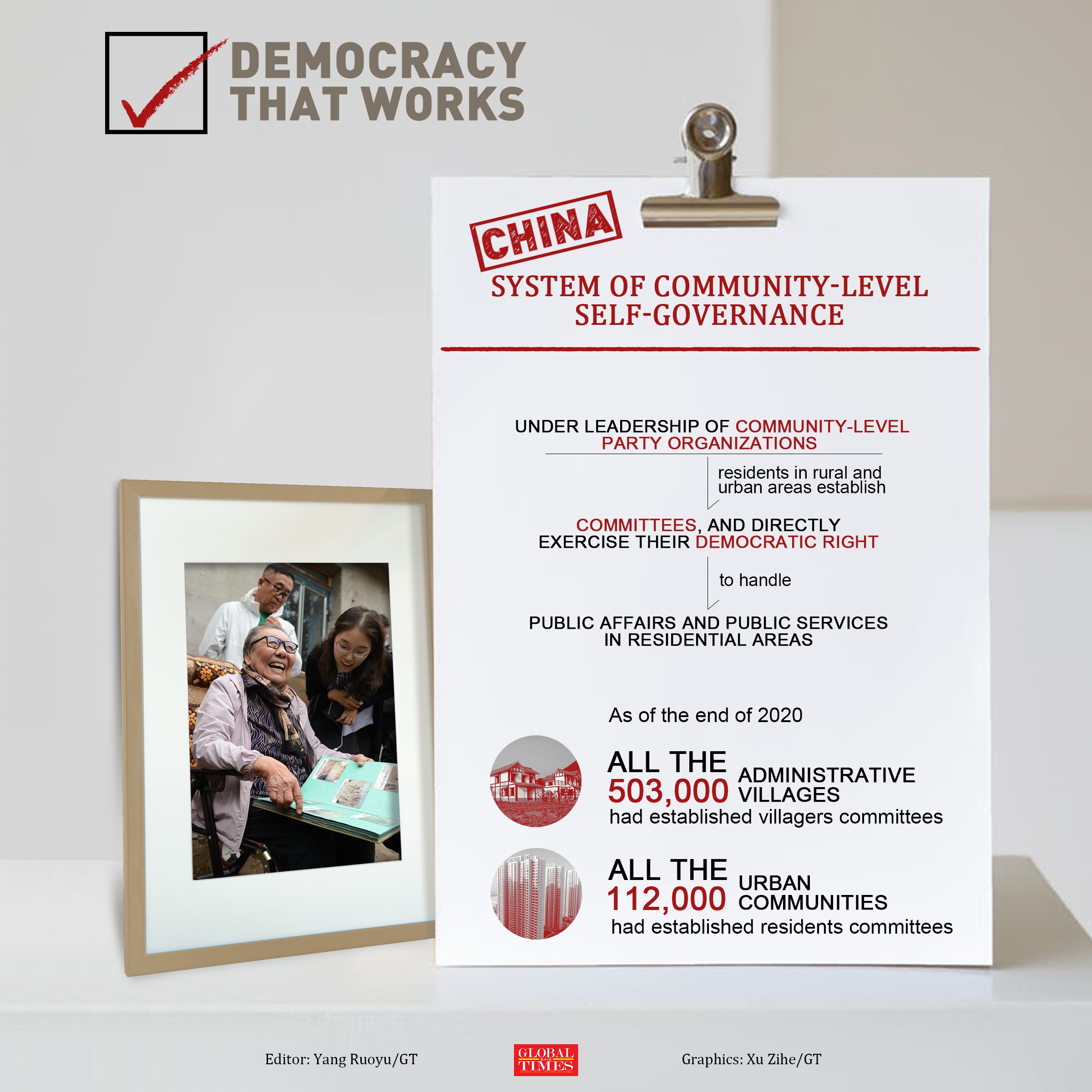
Democracy that works in China Graphics: Xu Zihe/GT
It noted that the Chinese people exercise state power effectively through people's congresses and people's congresses exercise state power collectively on behalf of the people. The people's congresses have the functions and powers in legislation, appointment and removal of officials, decision-making and supervision, said the white paper.
China's democracy is more extensive, more genuine and more effective than the US democracy, as the US politicians represent interest groups but in China the whole-process people's democracy ensures implementation of policies that change people's lives, senior Chinese officials said on Saturday during the press conference on the launch of the white paper.
US politicians make random promises for the sake of elections but seldom fulfill these promises after being elected. The effectiveness of China's democracy is also underscored in solving the problems and improving people's lives, Guo Zhenhua, Deputy Secretary General of the Standing Committee of the National People's Congress, told the press conference.
China has the confidence and strength in expounding on its democratic practice, as China has actively responded to people's requests and expectations, developed the whole-process people's democracy and achieved the widest participation of its people, Xu Lin, Vice Minister of the Publicity Department of the CPC Central Committee and Minister of the State Council Information Office, said at the press conference.
Democracy is the right of the people of all countries, not the patent of a few countries, Xu said. Whether a country is democratic or not should be judged by its people; whether or not a country in the international community is democratic should be judged by the international community, he noted.
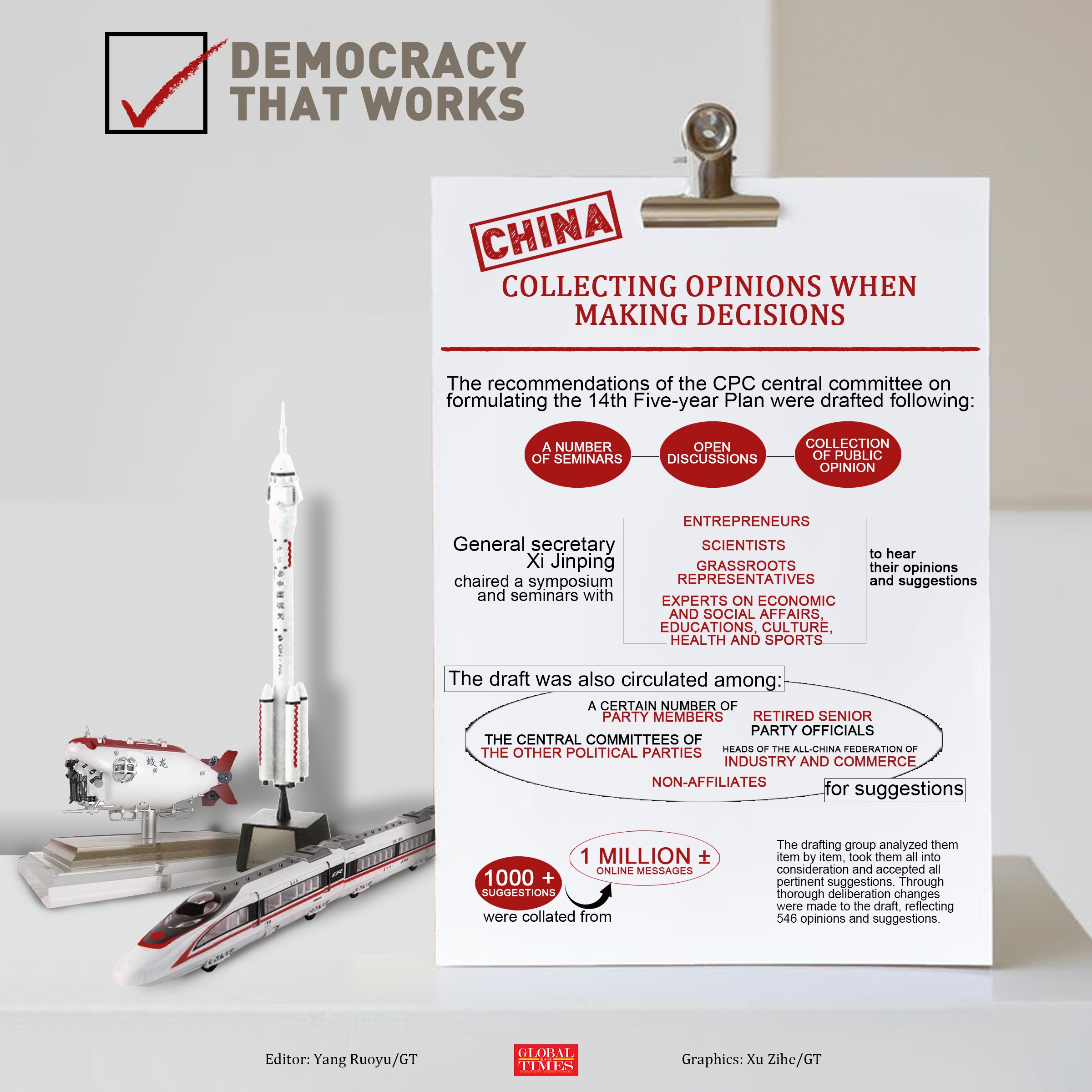
Democracy that works in China Graphics: Xu Zihe/GT
Facts speak louder
China's confidence on expounding on its own democratic practice is deemed from its own democratic practice, for example, in realizing the Xiaokang (or moderate prosperity) society, in completing the victory in eradicating absolute poverty, and especially in fighting the COVID-19 epidemic over the past year, Chang Jian, director of the Research Center for Human Rights at Tianjin-based Nankai University, told the Global Times on Saturday.
"Comparing the death toll caused by the epidemic in China and that number in the West, you can see how effective our democracy is," Chang said, noting that it also showed that China's democratic system works in confronting a huge crisis, helping its people get a better life and pushing forward the social development.
In comparison, Western democracy, sometimes, is just about staging a play, or about showing off the so-called process rather than representing the people's interests, Chang said.
China's whole-process people's democracy integrates two major democratic models - electoral democracy and consultative democracy to ensure people's full participation not only in voting, but also in the national governance, according to officials.
For example, Chinese people can fully exercise their rights on voting for candidates to the people's congresses, and participate in legislation especially during the process of soliciting public opinions, make decisions related to the country's development, and supervise law enforcement and implementation policies. China's democracy has also attached great importance on increasing people's sense of gain when they fully participate in the country's construction, Chang said.
However, under the US democratic system, politicians are agents of interest groups, rather than representing the interests of the majority of voters and the interests of the country as a whole, Tian Peiyan, Deputy Director of the Policy Research Office of the CPC Central Committee, said at the press conference on Saturday.
"Those politicians can make random promises for the sake of elections, but they seldom fulfill their promises after being elected. Superficially they accept voters' supervision, but in fact as long as they are elected, the voters have no option but to wait for the next election. They are only awakened during voting but become dormant after voting," Tian said.
US voters listen to those dazzling slogans only during the election, but they have no say after the election, the Chinese official said.
The system of multiparty cooperation and political consultations under the CPC leadership, broad patriotic united front, the system of regional autonomy and the system of community-level self-governance are also important parts of China's whole-process democracy, according to the white paper.
Concerning how democracy works in China, facts speak louder than words. The white paper, for example, indicates that as of the end of 2020, all the 503,000 administrative villages and all the 112,000 urban communities in China had established committees, where the residents can directly exercise their democratic right in residential areas.
While some Western countries have been continuously attacking and smearing China's policies on affairs related to ethnic minorities, particularly in Xinjiang Uygur Autonomous Region recently, but those groundless attacks cannot stop China's democratic practice of the regional ethnic autonomy.
Autonomous areas, for example, have autonomy in legislation, economic development, fiscal management, training and appointment of ethnic officials, education and culture development, as well as the use of ethnic languages and characters, according to the press conference.
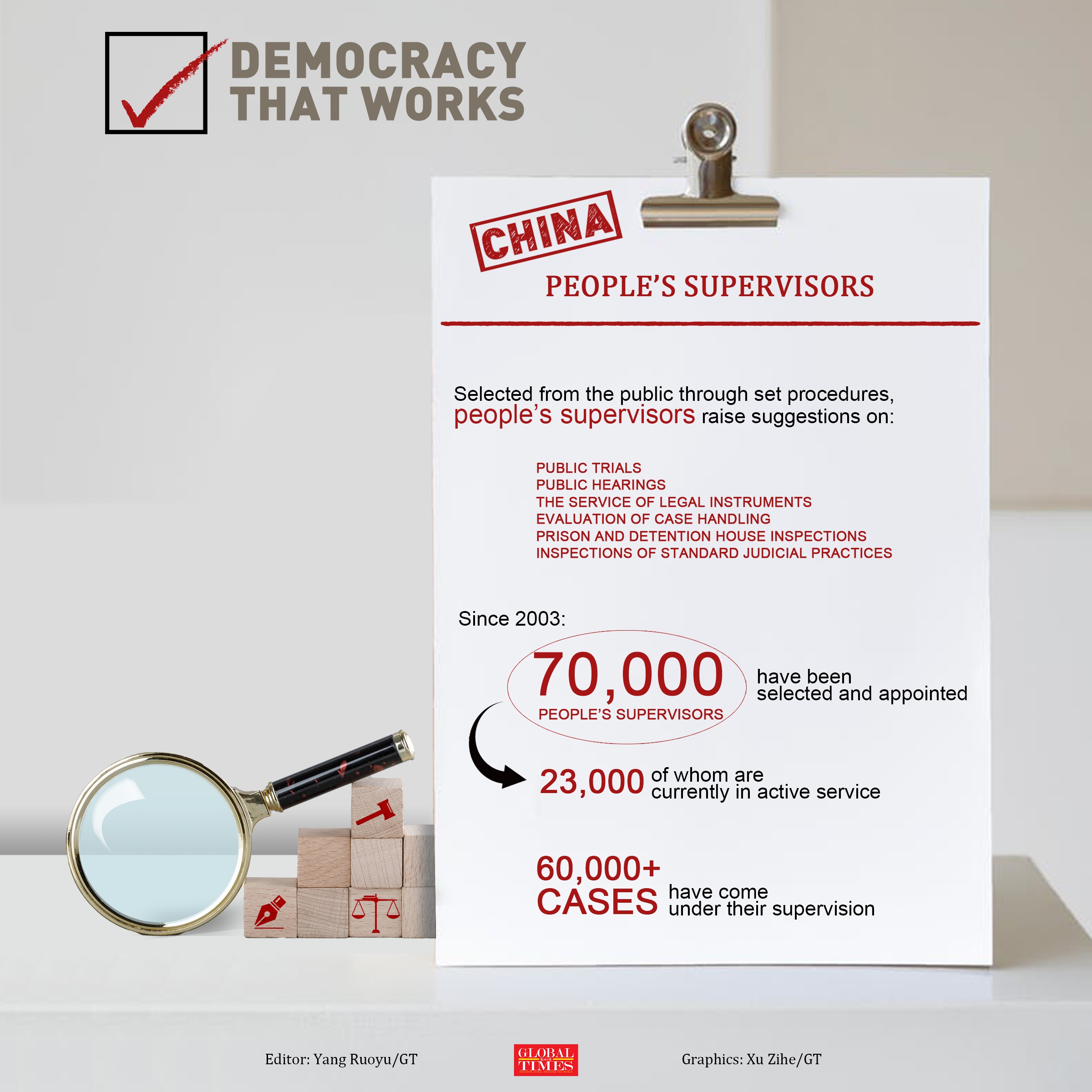
Democracy that works in China Graphics: Xu Zihe/GT
Good democracy vs bad democracy
The white paper also said that a good model of democracy should build consensus rather than create social rifts and conflicts, safeguard social equity and justice rather than widen social disparities in favor of vested interests, maintain social order and stability rather than cause chaos and turmoil.
China has been transformed since 1949 and is now more united than at any time in the last two hundred years, indeed probably ever, which is a remarkable achievement. No Western-style governing system could possibly have achieved this, Martin Jacques, a former senior fellow at the Department of Politics and International Studies at Cambridge University, said on Friday at the 2021 Understanding China Conference in a video speech.
"Such an achievement requires a different kind of governance, one that can think strategically, that is historically rooted, that is inclusive, that can mobilize the people, that can make things happen," Jacques said.
Compared to China's achievement in governance thanks to the effectiveness of its democratic practice, the ineffectiveness of US democracy was also amplified during the COVID-19 pandemic, experts said, noting that the bi-partisan system has been using the pandemic for its own propaganda instead of figuring out how to save more people.
From the shocking Capitol riots to the failure of the US to contain COVID-19 (deaths in 2021 surpassed the death toll in 2020, according to a report by the Wall Street Journal in November), all these expose the failure of US governance and severe loopholes in crisis-facing mechanism of the world's largest economy that is equipped with the most advanced healthcare system.
The US touts itself as a "beacon of democracy," but the fight against the pandemic has exposed a slew of drawbacks of its democracy. The fact that 50 million people have been infected and 800,000 died showed its democracy didn't bring voters any wellbeing but disaster, Tian said, addressing a question raised by the Global Times at the press conference.
"In contrast, China's democracy shows respect and protects every individual. Thanks to its institutional advantage, China has launched an unprecedented fight against the pandemic and made an all-out effort to save everyone, from newborn babies to the elderly aged over 100," he said.
Kenneth Hammond, professor of East Asian and global history at New Mexico State University, thinks that China's process is very different. "In China, you don't make a big display. But instead, that process goes on, and then once decisions are reached, once a kind of consensus emerges, then the question is put into practice."
"What you need is people who are committed to the public good and are going to work, not to advance their individual or even their group interest, but to find the things that work best for society as a whole. I think it's a democratic process in China. It's not the same kind of process that we have here. But it is a process that leads to the articulation and the effective management of social concern," Hammond told the Global Times.
China's political system today is as different from Western democracy as Chinese characters from Latin or Cyrillic alphabets. But it does not make this system inferior or less attractive, Yury Tavrovsky, head of the "Russian Dream-Chinese Dream" analytic center of the Izborsk Club, told the Global Times.
Tavrovsky noted that China's democracy and political system has gained remarkable and globally eye-catching social and economic achievements. They have developed an efficient market economy, the second biggest in the world. In the past 10 years they have rapidly improved the livelihood of Chinese people and eliminated poverty for the first time in history.
China's democracy model looks as harmonious in the Chinese political landscape as a beautiful pagoda. "To challenge it with a rather shaky and dilapidated Western skyscraper is not wise and may be even dangerous," Tavrovsky said.
Democracy summit 'a joke'
China's white paper on democracy was released against the backdrop that the US is trying to pull an alliance against China by drawing lines between so-called "democratic nations" and so-called "authoritarian nations," and the Biden administration is promoting the "democratic summit" to burnish the US image as a "democratic beacon."
While Chinese analysts consider the flaws of US democracy as too obvious to hide, casting a heavy shadow on the torch of the Statue of Liberty, Chinese officials called the US-manipulated summit "a joke" as the US uses the banner of democracy to crack down on countries with different systems and development models.
A few countries have a hegemonic mentality of recognizing countries with the same system as correct and those with a different one as wrong, excluding and attacking other models of democracy, which is undemocratic in nature, Xu noted at the press conference.
"Those countries have bad records in democracy, chaotic domestic governance, but point fingers at others' democracy and make groundless accusations. Is it democracy they advocate for?" he asked.
"One Person, One Vote" is a democratic principle, but it is by no means the only principle, nor does it create democracy. However, it has long been misinterpreted and its meaning distorted by a small number of countries," said the white paper.
The US has criticized China for not having a similar democratic pattern, and has smeared and attacked China's own exploration of democracy and turned a blind eye to China's development and achievements of democracy and human rights. But it is the US that distorted the core of democracy and promoted democratic hegemony globally, Chang said.
Oleg Ivanov, Deputy Head of the International and National Security Department, Diplomatic Academy, Moscow, cited US Secretary of State Antony Blinken's remarks that the erosion of democracy is also happening in the US with rampant disinformation, structural racism and inequality.
"Indeed, BLM, the storming of the US Capitol, the vehement exchange of insults between Democrats and Republicans, and the severe polarization of American society clearly indicates that US democracy is seriously sick. I do not mean to say that it is doomed to collapse tomorrow, but it is questionable that a sick society can be a beacon of democracy," Ivanov said
"American democracy may be attractive for other nations only if it gets rid of its flaws. So far, one can hardly predict it is going to happen soon," Ivanov noted.
US democracy has fundamental flaws, according to experts. Qian Jinyu, director of the Human Rights Research Center of Northwest University of Political Science and Law, said that during its development, Western democracy had turned the idea of everyone sharing the right to govern into electing representatives, which defined democratic politics as "the rule of politicians."
Western democracy is not the governance by the people but the governance by elites. The elites' political participation has replaced the people's political participation, and such democracy no longer cares about the political cultivation of individual citizens. The participation of the people in democracy is limited to their vote during the election, Qian told the Global Times.
Qian noted that US democracy attaches importance to process but overlooks the effects and results. But China's whole-process democracy has fixed the flaws while admitting the various forms of democracy, which is a unique contribution to human exploration of democracy and enriches the global theories on democracy.
Full Text: China: Democracy That Works
